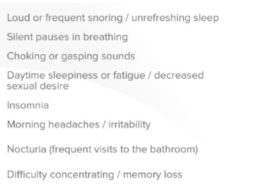
The Short-term Consequences of Obstructive Sleep Apnea.
Obstructive sleep apnea is a momentary closing of a person’s throat, usually because of an abnormality in pressure in the back of the throat. The result is that a person’s brain is alerted to wake up, sometimes multiple times a night, to restart breathing. They may also experience a drop in oxygen levels, as the lack of breathing means the lungs have not received the oxygen-rich air they need. But, what consequences can that have in the short-term?
For starters, waking up many times during the night causes sleep to be fragmented, meaning the good, deep sleep that makes us feel refreshed when we wake up hasn’t happened. Often, patients with sleep apnea wake up feeling tired and continue to feel tired during the day – often leading to severe daytime sleepiness, especially after lunch. This can result in a difficulty exercising or concentrating at work, or more dangerous effects, such as falling asleep while driving. In fact, people with documented sleep apnea have an eight-times higher risk of being in car accidents.
Often, it’s difficult to link tiredness to sleep apnea immediately, as it usually increases gradually over years, and patients often blame other challenges, such as menopause, depression or stress. Eventually, it’s “normal” that Dad always falls asleep at 8pm. Very occasionally, people with sleep apnea also have an increased number of bad dreams. They may complain that the dreams are making them tired, but the dreams are an effect of the apnea; the real reason for the tiredness. A good way to tell if you’re excessively sleepy, is to complete the Epworth Sleepiness Scale.
Secondly, part of the waking up process is a burst of adrenalin which, combined with a drop in oxygen, can put the heart under strain. It’s the reason some people wake up with heart palpitations or a feeling of anxiety. In young, fit people, this increased heart rate has very few consequences, but it can be problematic if you’re older, or already have heart trouble. In certain circumstances, it can mean that your normal, rapid heart rate can become abnormal. The sudden increase in blood pressure, thanks to the adrenalin, can also damage blood vessels, which can be particularly concerning if they’re in your heart or brain.









Write a Comment